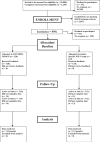Efficacy of personalized normative feedback as a brief intervention for college student gambling: a randomized controlled trial
- PMID: 26009785
- PMCID: PMC4939822
- DOI: 10.1037/a0039125
Efficacy of personalized normative feedback as a brief intervention for college student gambling: a randomized controlled trial
Abstract
Objective: Social influences on gambling among adolescents and adults have been well documented and may be particularly evident among college students, who have higher rates of problem and pathological gambling relative to the general population. Personalized normative feedback (PNF) is a brief intervention designed to correct misperceptions regarding the prevalence of problematic behavior by showing individuals engaging in such behaviors that their own behavior is atypical with respect to actual norms. The current randomized controlled trial evaluated a computer-delivered PNF intervention for problem gambling college students.
Method: Following a baseline assessment, 252 college student gamblers scoring 2+ on the South Oaks Gambling Screen (SOGS) were randomly assigned to receive PNF or attention-control feedback. Follow-up assessments were completed 3 and 6 months postintervention.
Results: Results indicated significant intervention effects in reducing perceived norms for quantities lost and won, and in reducing actual quantity lost and gambling problems at the 3-month follow-up. All intervention effects except reduced gambling problems remained at the 6-month follow-up. Mediation results indicated that changes in perceived norms at 3 months mediated the intervention effects. Further, the intervention effects were moderated by self-identification with other student gamblers, suggesting that PNF worked better at reducing gambling for those who more strongly identified with other student gamblers.
Conclusions: Results support the use of PNF as a stand-alone brief intervention for at-risk gambling students. Extending this approach more broadly may provide an accessible, empirically supported gambling prevention option for universities and related institutions.
(c) 2015 APA, all rights reserved).
Figures





Similar articles
-
Systematic Review of Preventive Programs for Reducing Problem Gambling Behaviors Among Young Adults.J Gambl Stud. 2020 Mar;36(1):1-22. doi: 10.1007/s10899-019-09866-9. J Gambl Stud. 2020. PMID: 31168687
-
Examining the efficacy of a personalized normative feedback intervention to reduce college student gambling.J Am Coll Health. 2014;62(3):154-64. doi: 10.1080/07448481.2013.865626. J Am Coll Health. 2014. PMID: 24295507 Free PMC article. Clinical Trial.
-
Coping Motives Moderate Efficacy of Personalized Normative Feedback Among Heavy Drinking U.S. College Students.J Stud Alcohol Drugs. 2016 May;77(3):495-9. doi: 10.15288/jsad.2016.77.495. J Stud Alcohol Drugs. 2016. PMID: 27172582 Free PMC article. Clinical Trial.
-
A randomized controlled trial of a personalized feedback intervention for problem gamblers.PLoS One. 2012;7(2):e31586. doi: 10.1371/journal.pone.0031586. Epub 2012 Feb 14. PLoS One. 2012. PMID: 22348112 Free PMC article. Clinical Trial.
-
Stand-Alone Personalized Normative Feedback for College Student Drinkers: A Meta-Analytic Review, 2004 to 2014.PLoS One. 2015 Oct 8;10(10):e0139518. doi: 10.1371/journal.pone.0139518. eCollection 2015. PLoS One. 2015. PMID: 26447792 Free PMC article. Review.
Cited by
-
Systematic Review of Preventive Programs for Reducing Problem Gambling Behaviors Among Young Adults.J Gambl Stud. 2020 Mar;36(1):1-22. doi: 10.1007/s10899-019-09866-9. J Gambl Stud. 2020. PMID: 31168687
-
Proximal and Distal Risk Factors for Gambling Problems Specifically Associated with Electronic Gaming Machines.J Gambl Stud. 2020 Mar;36(1):277-295. doi: 10.1007/s10899-019-09867-8. J Gambl Stud. 2020. PMID: 31172326
-
Usage of a Responsible Gambling Tool: A Descriptive Analysis and Latent Class Analysis of User Behavior.J Gambl Stud. 2016 Sep;32(3):889-904. doi: 10.1007/s10899-015-9590-6. J Gambl Stud. 2016. PMID: 26753878
-
What do we know about alcohol internet interventions aimed at employees?-A scoping review.Front Public Health. 2023 Jan 26;11:929782. doi: 10.3389/fpubh.2023.929782. eCollection 2023. Front Public Health. 2023. PMID: 36778564 Free PMC article.
-
Cryptocurrency Trading, Day Trading, and Gambling Behavior: Examining the Moderating Effects of Financially Focused Self-Concept and Gambling Motives.J Gambl Stud. 2025 Mar;41(1):67-89. doi: 10.1007/s10899-024-10343-1. Epub 2024 Aug 17. J Gambl Stud. 2025. PMID: 39153016
References
-
- Abrams D, Hogg MA. Social identity and social cognition. Blackwell; Malden, MA: 1999.
-
- Ajzen I, Fishbein M. Understanding attitudes and predicting social behavior. Prentice Hall; Englewood Cliffs, NJ: 1980.
-
- American Psychiatric Association . Diagnostic and statistical manual of mental disorders. 4th ed. Author; Washington, DC: 1994.
-
- Arnett JJ. Emerging adulthood. A theory of development from the late teens through the twenties. American Psychologist. 2000;55:469–480. http://dx.doi.org/10.1037/0003-066X.55.5.469. - DOI - PubMed
-
- Atkins DC, Gallop RJ. Rethinking how family researchers model infrequent outcomes: A tutorial on count regression and zero-inflated models. Journal of Family Psychology. 2007;21:726–735. http://dx .doi.org/10.1037/0893-3200.21.4.726. - DOI - PubMed
Publication types
MeSH terms
Grants and funding
LinkOut - more resources
Full Text Sources
Other Literature Sources
Medical

